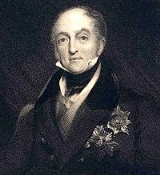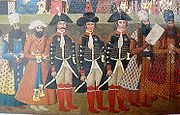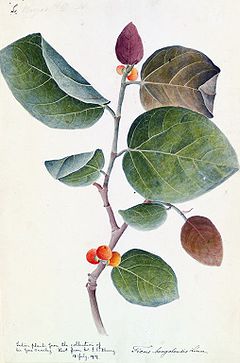
Gore Ouseley
Encyclopedia
Sir Gore Ouseley, 1st Baronet GCH
(24 June 1770-18 November 1844), was a British entrepreneur, linguist and diplomat. He was born in 1770 and died at Hall Barn Park, Beaconsfield
, Buckinghamshire
in 1844. He negotiated an important treaty between Russia and Persia in 1814 which redrew their common borders.
and his cousin, Gideon Ouseley
. All three had notable careers.
he became a friend of the local Nawab Saadat Ali Khan
and was responsible for building a palace called Dilkusha Kothi
on the banks of the Gomti near Lucknow
. This palace stood for about fifty years until it was damaged in the Siege of Lucknow
. The palace was a copy of the English Baroque
stately home
of Seaton Delaval Hall
.
He made his name in India where he was appointed a Major-Commander. He was made a baronet in 1808 with the recommendation of Lord Wellesley
.
 He served as ambassador to Persia from 1810 where he was involved with negotiating treaties principally with Persia and Russia. He was accompanied by his brother as secretary, Sir William Ouseley
He served as ambassador to Persia from 1810 where he was involved with negotiating treaties principally with Persia and Russia. He was accompanied by his brother as secretary, Sir William Ouseley
, who like Gore was a keen orientalist
. (He was the first ambassador to Persia since Sir Dodmore Cotton was sent by Charles I
). Nominally he was supporting the Shah of Persia (Fat′h Ali Shah Qajar). The most important was The Treaty of Gulistan: Гюлистанский договор; ) which was prepared by the ambassador with the help of the British Foreign Office. The treaty confirmed the inclusion of modern day Azerbaijan
, Daghestan and Eastern Georgia
into the Russian Empire
. This was agreed on 24 October 1813.

. He was also responsible for publishing an early translation of the New Testament into Persian. The translation had been made by a friend, the Reverend Henry Martyn
, and Mirza Saiyad Ali Kahn. Martyn had died on his way back to England so Gore Ouseley had agreed to arrange publication of the manuscript. This he did in St Petersburg, carrying out the proof reading personally. This version was later refined and republished in Calcutta.
.
Ouseley had taught himself Sanskrit
, Arabic and Persian
, and for enjoyment, he and his brother William advanced the study of Persia. William published a number of books, but those by Gore were not published until after his death.
In 1833, the family were living at Hall Barns, and he enjoyed gardening and building work as he had done in India. In 1835, he served as the High Sheriff of Buckinghamshire
.
He became President of the Society for the Publication of the Oriental Texts in 1842 and he is credited with the society's publication of Gulistan of Sa'di by Sa'di
, which had a translation by Francis Gladwin.
There is a monument to his memory in Hertingfordbury
Church, Hertfordshire
and his collection of Mughal paintings are at the Bodleian Library
in Oxford (they were donated in 1859 by a Bengal civil servant, Mr JB Elliott).
His son, The Revd Canon Professor Sir Frederick Arthur Gore Ouseley
(12 August 1825 – 6 April 1889) was an English composer, organist, and musicologist.
Royal Guelphic Order
The Royal Guelphic Order, sometimes also referred to as the Hanoverian Guelphic Order, is a Hanoverian order of chivalry instituted on 28 April 1815 by the Prince Regent . It has not been conferred by the British Crown since the death of King William IV in 1837, when the personal union of the...
(24 June 1770-18 November 1844), was a British entrepreneur, linguist and diplomat. He was born in 1770 and died at Hall Barn Park, Beaconsfield
Beaconsfield
Beaconsfield is a market town and civil parish operating as a town council within the South Bucks district in Buckinghamshire, England. It lies northwest of Charing Cross in Central London, and south-east of the county town of Aylesbury...
, Buckinghamshire
Buckinghamshire
Buckinghamshire is a ceremonial and non-metropolitan home county in South East England. The county town is Aylesbury, the largest town in the ceremonial county is Milton Keynes and largest town in the non-metropolitan county is High Wycombe....
in 1844. He negotiated an important treaty between Russia and Persia in 1814 which redrew their common borders.
Early life
Sir Gore Ouseley was born in Limerick in Ireland to Ralph and Elizabeth (born Holland) Ouseley. Gore's father's family was originally from Shropshire. Gore and his brother were tutored at home in the company of brother, WilliamWilliam Ouseley
Sir William Ouseley , was a British Orientalist.-Early life:Ouseley was born in Monmouthshire, the eldest son of Captain Ralph Ouseley and his wife Elizabeth . He was tutored at home in the company of his brother, Gore and his cousin, Gideon Ouseley. All three had notable careers...
and his cousin, Gideon Ouseley
Gideon Ouseley
Gideon Ouseley was born into an Anglican gentry family in Dunmore, County Galway.-Biography:He spent much of his childhood in the cabins of peasant neighbours. Later, during a wild youth, he lost an eye in a tavern brawl, a loss that reputedly left him with a frightening appearance. Ouseley was...
. All three had notable careers.
India
Whilst serving the British Government and posted in LucknowLucknow
Lucknow is the capital city of Uttar Pradesh in India. Lucknow is the administrative headquarters of Lucknow District and Lucknow Division....
he became a friend of the local Nawab Saadat Ali Khan
Saadat Ali Khan
Saadat Ali Khan was the fifth nawab wazir of Oudh from 21 January 1798 to 11 July 1814, and the son of Muhammad Nasir.-Life:He was the second son of Nawab Shuja-ud-daula...
and was responsible for building a palace called Dilkusha Kothi
Dilkusha Kothi
Dilkusha Kothi is the remains of an eighteenth-century house built in the English baroque style in the quiet Dilkusha area of Lucknow in India. Today there are only a few towers and external walls as a monument, though the extensive gardens remain...
on the banks of the Gomti near Lucknow
Lucknow
Lucknow is the capital city of Uttar Pradesh in India. Lucknow is the administrative headquarters of Lucknow District and Lucknow Division....
. This palace stood for about fifty years until it was damaged in the Siege of Lucknow
Siege of Lucknow
The Siege of Lucknow was the prolonged defense of the Residency within the city of Lucknow during the Indian Rebellion of 1857. After two successive relief attempts had reached the city, the defenders and civilians were evacuated from the Residency, which was abandoned.Lucknow was the capital of...
. The palace was a copy of the English Baroque
English Baroque
English Baroque is a term sometimes used to refer to the developments in English architecture that were parallel to the evolution of Baroque architecture in continental Europe between the Great Fire of London and the Treaty of Utrecht ....
stately home
Stately home
A stately home is a "great country house". It is thus a palatial great house or in some cases an updated castle, located in the British Isles, mostly built between the mid-16th century and the early part of the 20th century, as well as converted abbeys and other church property...
of Seaton Delaval Hall
Seaton Delaval Hall
Seaton Delaval Hall is a Grade I listed country house in Northumberland, England. It is near the coast just north of Newcastle upon Tyne. Located between Seaton Sluice and Seaton Delaval, it was designed by Sir John Vanbrugh in 1718 for Admiral George Delaval and is now owned by the National...
.
He made his name in India where he was appointed a Major-Commander. He was made a baronet in 1808 with the recommendation of Lord Wellesley
Richard Wellesley, 1st Marquess Wellesley
Richard Colley Wesley, later Wellesley, 1st Marquess Wellesley, KG, PC, PC , styled Viscount Wellesley from birth until 1781, was an Anglo-Irish politician and colonial administrator....
.
Persia

William Ouseley
Sir William Ouseley , was a British Orientalist.-Early life:Ouseley was born in Monmouthshire, the eldest son of Captain Ralph Ouseley and his wife Elizabeth . He was tutored at home in the company of his brother, Gore and his cousin, Gideon Ouseley. All three had notable careers...
, who like Gore was a keen orientalist
Oriental studies
Oriental studies is the academic field of study that embraces Near Eastern and Far Eastern societies and cultures, languages, peoples, history and archaeology; in recent years the subject has often been turned into the newer terms of Asian studies and Middle Eastern studies...
. (He was the first ambassador to Persia since Sir Dodmore Cotton was sent by Charles I
Charles I of England
Charles I was King of England, King of Scotland, and King of Ireland from 27 March 1625 until his execution in 1649. Charles engaged in a struggle for power with the Parliament of England, attempting to obtain royal revenue whilst Parliament sought to curb his Royal prerogative which Charles...
). Nominally he was supporting the Shah of Persia (Fat′h Ali Shah Qajar). The most important was The Treaty of Gulistan: Гюлистанский договор; ) which was prepared by the ambassador with the help of the British Foreign Office. The treaty confirmed the inclusion of modern day Azerbaijan
Azerbaijan
Azerbaijan , officially the Republic of Azerbaijan is the largest country in the Caucasus region of Eurasia. Located at the crossroads of Western Asia and Eastern Europe, it is bounded by the Caspian Sea to the east, Russia to the north, Georgia to the northwest, Armenia to the west, and Iran to...
, Daghestan and Eastern Georgia
Georgia (country)
Georgia is a sovereign state in the Caucasus region of Eurasia. Located at the crossroads of Western Asia and Eastern Europe, it is bounded to the west by the Black Sea, to the north by Russia, to the southwest by Turkey, to the south by Armenia, and to the southeast by Azerbaijan. The capital of...
into the Russian Empire
Russian Empire
The Russian Empire was a state that existed from 1721 until the Russian Revolution of 1917. It was the successor to the Tsardom of Russia and the predecessor of the Soviet Union...
. This was agreed on 24 October 1813.

Russia
After his brother returned to England in 1813 to write, he left the next year, stopping off in St Petersburg. Whilst he was in Russia he was awarded the Grand Cordon of the Russian Order of St. Alexander NevskyOrder of St. Alexander Nevsky
The Imperial Order of St. Alexander Nevsky was an order of chivalry of the Russian Empire.-History:The introduction of the Imperial Order of St. Alexander Nevsky was planned by Emperor Peter I of Russia...
. He was also responsible for publishing an early translation of the New Testament into Persian. The translation had been made by a friend, the Reverend Henry Martyn
Henry Martyn
Henry Martyn was an Anglican priest and missionary to the peoples of India and Persia. Born in Truro, Cornwall, he was educated at Truro Grammar School and St John's College, Cambridge. A chance encounter with Charles Simeon led him to become a missionary...
, and Mirza Saiyad Ali Kahn. Martyn had died on his way back to England so Gore Ouseley had agreed to arrange publication of the manuscript. This he did in St Petersburg, carrying out the proof reading personally. This version was later refined and republished in Calcutta.
England
On his return to England in 1815, Ouseley was not made a peer as he had expected (and despite a recommendation). He did however arrange for some gifts of antiquities to be given to the British MuseumBritish Museum
The British Museum is a museum of human history and culture in London. Its collections, which number more than seven million objects, are amongst the largest and most comprehensive in the world and originate from all continents, illustrating and documenting the story of human culture from its...
.
Ouseley had taught himself Sanskrit
Sanskrit
Sanskrit , is a historical Indo-Aryan language and the primary liturgical language of Hinduism, Jainism and Buddhism.Buddhism: besides Pali, see Buddhist Hybrid Sanskrit Today, it is listed as one of the 22 scheduled languages of India and is an official language of the state of Uttarakhand...
, Arabic and Persian
Persian language
Persian is an Iranian language within the Indo-Iranian branch of the Indo-European languages. It is primarily spoken in Iran, Afghanistan, Tajikistan and countries which historically came under Persian influence...
, and for enjoyment, he and his brother William advanced the study of Persia. William published a number of books, but those by Gore were not published until after his death.
In 1833, the family were living at Hall Barns, and he enjoyed gardening and building work as he had done in India. In 1835, he served as the High Sheriff of Buckinghamshire
High Sheriff of Buckinghamshire
The High Sheriff of Buckinghamshire, in common with other counties, was originally the King's representative on taxation upholding the law in Saxon times...
.
He became President of the Society for the Publication of the Oriental Texts in 1842 and he is credited with the society's publication of Gulistan of Sa'di by Sa'di
Saadi (poet)
Abū-Muḥammad Muṣliḥ al-Dīn bin Abdallāh Shīrāzī better known by his pen-name as Saʿdī or, simply, Saadi, was one of the major Persian poets of the medieval period. He is not only famous in Persian-speaking countries, but he has also been quoted in western sources...
, which had a translation by Francis Gladwin.
There is a monument to his memory in Hertingfordbury
Hertingfordbury
Hertingfordbury is a small village and civil parish in Hertfordshire, England, close to the county town of Hertford. It was mentioned in the Domesday Book.-Location:...
Church, Hertfordshire
Hertfordshire
Hertfordshire is a ceremonial and non-metropolitan county in the East region of England. The county town is Hertford.The county is one of the Home Counties and lies inland, bordered by Greater London , Buckinghamshire , Bedfordshire , Cambridgeshire and...
and his collection of Mughal paintings are at the Bodleian Library
Bodleian Library
The Bodleian Library , the main research library of the University of Oxford, is one of the oldest libraries in Europe, and in Britain is second in size only to the British Library...
in Oxford (they were donated in 1859 by a Bengal civil servant, Mr JB Elliott).
His son, The Revd Canon Professor Sir Frederick Arthur Gore Ouseley
Frederick Ouseley
Sir Frederick Arthur Gore Ouseley, 2nd Baronet was an English composer, organist, and musicologist.He was born in London, the son of Sir Gore Ouseley, and manifested an extraordinary precocity in music, composing an opera at the age of eight years. In 1844, having succeeded to the baronetcy, he...
(12 August 1825 – 6 April 1889) was an English composer, organist, and musicologist.
Books
- "Remarks on the Statistics and Political Institutions of the United States, with some Observations on the Ecclesiastical System of America, her sources of Revenue, &c", 1832
- Biographical Notices of Persian Poets, 1846 (published 2 years after his death)
Honours
- Baronet
- Grand Cordon of the Russian order of St. Alexander NewskiOrder of St. Alexander NevskyThe Imperial Order of St. Alexander Nevsky was an order of chivalry of the Russian Empire.-History:The introduction of the Imperial Order of St. Alexander Nevsky was planned by Emperor Peter I of Russia...
. - Order of the Lion and the SunOrder of the Lion and the SunThe Order of the Lion and the Sun was instituted by Fat’h Ali Shah of the Qajar Dynasty in 1808 to honour foreign officials who had rendered distinguished services to Persia. In 1925, under the Pahlavi dynasty the Order continued as the Order of Homayoun with new insignia, though based on the...
- President of the Society for the Publication of Oriental Texts
- Fellow of the Royal Society
- Fellow of the Society of Antiquaries
- High Sheriff of BuckinghamshireHigh Sheriff of BuckinghamshireThe High Sheriff of Buckinghamshire, in common with other counties, was originally the King's representative on taxation upholding the law in Saxon times...
in 1835

